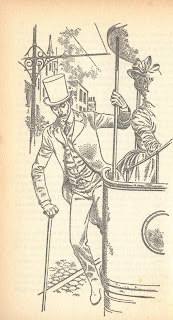By Aurora Ledesma
BIOGRAPHY
William Wymark Jacobs was born on September 8th, 1863 in Wapping (London). The eldest son of William Gage Jacobs, and his first wife, Sophia Wymark, who died when Jacob was very young. Jacob’s father was the manager of a South Devon wharf, and young Jacobs spent much time with his brothers and sisters among the wharves, observing the comings and goings of the ships and their crews.
The Jacobs were a large poor family and; young W.W. as he was called by his friends, was shy and had a fair complexion. Jacobs attended a private school in London and later went to Birkbeck College (now part of the University of London). In 1879, Jacobs began work as a clerk in the civil service, in the Post Office Savings Bank, and by 1885 he had his first short story published, but success come slowly. Most of his work was humorous, and his favourite subject was marine life. His first collection of stories “Many Cargoes” shows the lives of men who go down to the sea in ships.
Jacobs is remembered for a macabre tale, “The Monkey’s Paw”, which was published in 1902 in a short-story collection, The Lady of the Barge, with several other ghost stories.
Another collection of short stories, Sea Urchins, made him very popular. From October 1898, Jacob’s stories appeared in the Strand Magazine, which provided him with financial security almost up to his death.
By 1899, Jacobs was able to quit his job at the post office and finally begin making a living as a full-time writer. He married Agnes Eleanor Williams. The couple had five children, though their marriage was considered an unhappy one.
In his late years, Jacobs wrote dramatizations and adaptations of his existing stories. Jacobs’s legacy remains solid: he continued Dickens’s tradition for sharing working class stories in authentic vernacular.
Jacobs died in a North London nursing home on September 1st, 1943 a week prior to his 80th birthday.
SUMMARY
On a dark and stormy
night, the family Mr. & Mrs. White and their son Herbert, are enjoying a cosy
evening around the fire. A family friend, Sergeant - Major Morris arrives for a
visit and tells them stories about his adventures during his military service
in India. He shows them a monkey’s paw and tells them that it has the power to
grant anyone three wishes. Mr. White is interested in buying it; however,
Morris says that people have bad luck after their wishes are granted. When he
was about to throw the paw in the fire, Mr. White grabs it from him.
After Morris left, the
family discusses the wishes. Mr. White, following Herbert’s suggestion, asks for 200 pounds
which he can use to pay off his mortgage. The family waits, but nothing happens. Next day,
Herbert goes to work and does not return. In the evening, a person from his
company comes to their house and tells them that their son has had an accident with
the machinery and died. He says that the company is not responsible for the
accident. However, as compensation the company gives the family a check of 200
Pounds.
Mr. White goes to identify
his son’s body and bury it. After a short discussion, Mrs. White orders his
husband to make a wish to see her son alive. After a while, somebody knocks at
the door, and she goes to open it. Mr. White remembers his son’s mutilated body
during the burial and makes the third wish. The knocking at the door suddenly
stops, they open the door and find no one there.
Talk about the characters
>Mr White
>Mrs White
>Herbert White
>Sergeant Morris
>The man from Maw & Meggins
Mrs White tries to calm down her husband when he's
lost the game. What do you usually do to calm down another person?
Let's talk about superstitions, magic, talismans... Do
you have any anecdote about the topic?
What do you think about fate? Do you believe in fate?
Do you think there is a relation between cosmos and people?
Can you imagine which were the sergeant wishes?
And the first man's wishes?
What did Mrs White wish for the house?
If you had three wishes, what would you wish and why?
Do you remember other ways of saying wishes? Can you
explain them?
Do you think Mrs White would accept her son as he was
after the accident?
Would you do the same as the father with the third
wish? Why?
Can you imagine another ending for the story?




